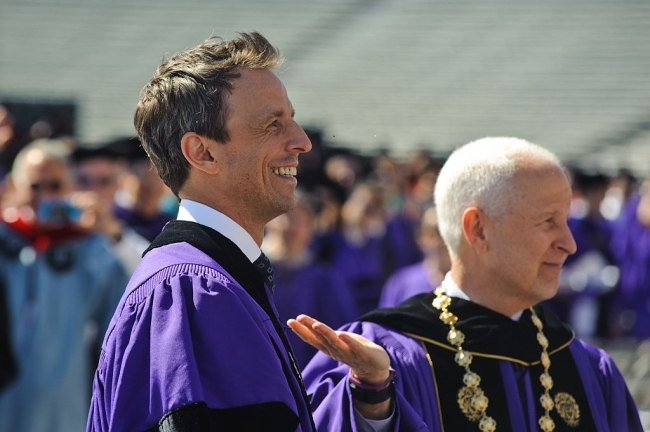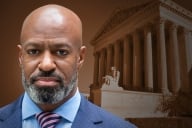You have /5 articles left.
Sign up for a free account or log in.

Northwestern University president Morton O. Schapiro (right) attends the university's commencement in 2016.
Getty Images/Timothy Hiatt
After getting attention when the Varsity Blues scandal sparked outrage about privilege in college admissions, the practice of giving preferential treatment to the children of alumni is receiving renewed scrutiny.
Presidential candidate and former New York City mayor Michael Bloomberg, in the higher education plan he unveiled last week, proposed that institutions of higher education be more transparent about the role legacy plays in admissions. He also raised the possibility of barring federal funding for colleges and universities that give preference based on legacy.
The issue also flared a few days earlier when Morton Schapiro, Northwestern University’s president, raised eyebrows and received some mockery for an unusually open defense of the practice during an interview with the campus newspaper.
“Wouldn’t it be ironic, now that we have a substantially more diverse student body, if the kids of those graduates all of a sudden didn’t get the legacy advantage that the rest of the people in their dorms did when they were there,” he told the Daily Northwestern.
Michael Dannenberg, a critic of legacy admissions and Education Reform Now’s director of strategic initiatives for policy, responded in a tweet, "The issue with banning the legacy preference isn't one of irony. It's one of right and wrong."
The practice of legacy admissions has been criticized for decades for being unfair to applicants who are lower income and members of minority groups, because children of alumni of selective institutions tend to be white and wealthy. An Education Trust report in January on reducing racial inequities in higher education called for tapering off policies like legacy admissions, which "have been shown to disproportionately benefit white and wealthy students."
In becoming the first, and thus far the only, candidate for the Democratic presidential nomination to raise the issue, Bloomberg in his plan noted that only 7 percent of students at highly competitive colleges come from low-income families.
The plan cited an Opportunity Insights study that projected that if lower-income applicants were given an admissions boost equivalent to a 160 points on the SAT -- an estimated equivalent of what legacy applicants receive on average -- the share of low-income students at highly selective colleges would triple, from 4 percent to 12 percent.
Tiffany Jones, Education Trust’s senior director of higher education policy, said other equity issues also need to be addressed at the majority of colleges that are not among the most selective. But she noted that before Johns Hopkins University ended the practice, the institution enrolled more legacy students than Pell Grant recipients. That flipped after the university ended the policy.
Rather than proposing a boost in scores for low-income applicants, Bloomberg called for requiring institutions to make public the admission rates of legacy applicants compared to others. If that move doesn’t end the practice, Bloomberg said he’d consider stronger measures, like cutting off federal funds to institutions that give preference to the children of alumni.
Bloomberg’s campaign told Inside Higher Ed the proposal has less to do with the January announcement by his alma mater, Johns Hopkins University, that it had ended legacy preferences, than with his belief in fairness and getting ahead based on the merits.
“Mike will call for an end to giving children of alumni advantages in the college admissions process, to level the playing field for all students,” the plan said.
The issue isn't new, said Dannenberg, a former senior policy adviser at the Education Department and aide to Democratic senators Edward Kennedy and Claiborne Pell. Kennedy, for instance, introduced a bill in 2004 that would have required institutions to disclose legacy admissions or face the loss of federal funds.
Rachel Fishman, New America’s deputy director for education policy research, said concern about legacy admissions continues to resonate after the Varsity Blues scandal "increased scrutiny of the unfairness of the [admissions] process and how it is stacked against certain families."
In response to the scandal, New America proposed to Senate Democrats that colleges should lose their federal aid eligibility if they offer early-decision admissions or give preferences to children of alumni. The think tank also said universities that receive federal research funds should be required to use some form of lottery admissions. Senator Ron Wyden, an Oregon Democrat, also introduced a bill to end the tax benefit for donations made to colleges and universities before or during the enrollment of children of the donor’s family.
The issue also is important amid attacks on affirmative action in admissions, said Fishman, like the lawsuit against Harvard University. If affirmative action based on race is being questioned, Fishman said, so should be legacy admissions, “which is affirmative action for the white and the wealthy.”
The call to end the practice also has similarities with the push by several Democratic candidates, including Bloomberg, to offer at least free community college, said Dannenberg, who said there are positives in all the candidates’ plans.
“Free college is about everyone having access to higher education in some form,” he said. “Ending legacy admissions is about ensuring everyone has a fair chance to attend the school of their choice.”
Wealthy Alumni and Broadened Access
It’s unclear, though, if other Democratic candidates in the presidential race will follow Bloomberg’s lead. None returned inquiries. The congressional offices of candidates who serve in the Senate also did not comment.
Meanwhile, institutions that do factor legacy status in admissions said the practice brings benefits, like maintaining relationships with alumni, and shouldn’t be barred.
Schapiro, in his interview with the Daily Northwestern, argued, “It depends on what you do with legacies. If you’re breaking ties [between applicants], is that really the end of the world?”
In a statement to Inside Higher Ed, Schapiro acknowledged concerns about the practice. "Our institutions have to maintain integrity in admissions by not giving away seats to students from wealthy families who may be academically underqualified," he said.
But he added, “beyond this, I don’t believe there are one-size-fits-all solutions for all schools.”
He argued that the university over the past decade has increased the number of Pell-eligible students it enrolls, currently a 20 percent share of its first-year class. Northwestern also has committed more than $200 million in undergraduate financial assistance, one of the largest amounts in the country.
But to do that, he said the university needs funding from alumni.
“The fact is that loyal, multi-generational Northwestern families help provide many of the resources that are allowing us to broaden access,” he said. “And I hope that many of the underrepresented and low-income students at Northwestern today go on to become dedicated alumni who feel the same investment in the future of their alma mater, and who hope to see their children follow in their footsteps.”
Given those considerations, Schapiro said there’s a role for a limited consideration of whether an applicant’s parent went to Northwestern. “A lot depends on what a school does with legacies,” he said. “It may involve breaking ties between roughly equal applicants. But if a school is making major concessions to a less-qualified applicant, that’s difficult to justify.”
Critics said there’s no justification for a practice they consider inherently unfair to lower-income and minority applicants. They scoffed at the idea that maintaining the process will help underrepresented groups.
It hasn’t worked out so far, Fishman said. “If what President Shapiro is saying were true, wouldn't we expect things to look differently at this point?” she said, pointing to a 2017 New York Times analysis based on federal data.
The analysis found that the nationwide share of black freshmen at 100 colleges ranging from public flagship universities to Ivy League members is virtually unchanged since 1980.
"If you really want to promote diversity, there are better ways of doing it other than an unfair, unjust, immoral practice," Dannenberg said.
Jones doubted many low-income families would lose out if legacy admissions are ended, given their relatively small number. “That’s not a phenomenon I’m worried about,” she said.
Harvard in a statement said only that it values diversity, "from its capacity for academic excellence to its ability to help create a campus community that gives each student the opportunity to learn from peers with a wide variety of academic interests, perspectives and talents."
However, research entered as evidence in the suit challenging the university’s affirmative action policies showed that a shrinking percentage of the students the university is admitting as legacies is white.
According to the research by David Card, an economist at the University of California, Berkeley, which was cited in the federal lawsuit filed by Asian American applicants to challenge Harvard’s affirmative action policies, 80 percent of university's legacy admissions in 2014 were white. But in 2019 that percentage had dropped to 61 percent.
In 2017, a Harvard committee examining the idea of dropping the consideration of race from its admissions process also looked at other practices, such as considering if an applicant’s parents attended Harvard College or Radcliffe College.
The committee defended the practice, saying it “helps to cement strong bonds between the university and its alumni.” One benefit of that is “generous financial support to their alma mater,” the committee said, which in turn helps increase diversity by supporting the financial aid students receive.
“Although alumni support Harvard for many reasons, the committee is concerned that eliminating any consideration of whether an applicant’s parent attended Harvard or Radcliffe would diminish this vital sense of engagement and support,” the report said.
Dannenberg bristles at the idea of maintaining legacy admissions to raise money. “If they really wanted to use admissions to boost fundraising, a more efficient way would be to just auction off acceptance letters on eBay,” he said.
Neither Harvard nor Northwestern would comment on Bloomberg’s proposal.
But in a statement, Peter McPherson, president of the Association of Public and Land-grant Universities, called legacy admissions “a practice at odds with public universities’ commitment to fairness.”
But he said “we think this is a decision, however, that should be left to universities themselves, not the federal government.”
Sarah Flanagan, the National Association of Independent Colleges and Universities’ vice president for government relations and policy, declined to comment on Bloomberg’s proposal. But she said in a statement, “it would be nearly impossible to develop a fair federal policy that would avoid negatively affecting the less selective schools that rely on word of mouth, including from family members who are graduates, to bring in students.”








